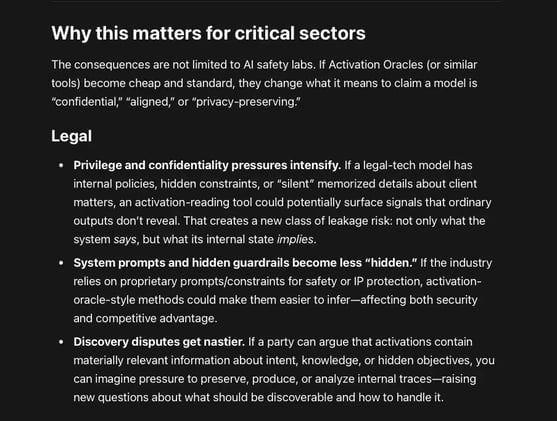- Pascal's Chatbot Q&As
- Archive
- Page -2
Archive
Activation Oracles (AOs): large language models that are trained to “read” another model’s internal activations (the huge arrays of numbers produced inside the network while it thinks)
A model can refuse to disclose something in its outputs, yet still carry that information in an internal form that another model can translate into words. Controls must not only cover outputs...

EPSTEIN CASE: The total volume of data available to the FBI and DOJ exceeds 14.6 terabytes, yet the public repository released on January 30, 2026, encompasses only about 300 gigabytes.
This raises critical questions regarding institutional transparency, the integrity of the release process, and the potential concealment of high-profile co-conspirators.

AI as a Justice-System Risk Multiplier: (1) implementation mistakes, (2) questionable “fit” to the real-world population, and (3) legal/ethical fragility around data and proxies.
The model becomes a quiet policy lever, nudging outcomes across thousands of cases while leaving only a faint trace of how much it influenced each decision.

If a client (or potentially a lawyer) runs facts, theories, timelines, or “talking points for counsel” through a third-party AI tool...
...a court may treat the resulting materials less like private draft communications and more like ordinary third-party research—discoverable by the other side.

WhatsApp v EDPB: Companies can bring a direct EU-level court challenge against a binding Board decision—rather than being forced to wait and fight only through national court proceedings.
Who benefits most? Large multinationals facing major cross-border enforcement—because they now have an additional (and potentially more strategically attractive) litigation route.

Doe 1 v. Github/Microsoft/OpenAI: Much of the proof—prompt logs, output frequencies, memorization testing, preprocessing pipelines, “cleaning” steps—is uniquely in defendants’ possession...
...and if courts require plaintiffs to plead those internal details before discovery, many DMCA/AI claims will die at the gate. The defense, of course, wants exactly that gate.

Gemini: The probability that the Trump administration studied the Epstein files first and strategically assembled its Cabinet and supporter network on the basis of these findings...
...specifically to prevent legal fallout and consolidate control over future prosecutions—is estimated at 85%.

If this trajectory continues, the US faces the prospect of becoming a permanent autocracy, where federal law enforcement serves as the primary mechanism for maintaining the power of the ruling party.
Survival of the American democratic experiment may depend on restoration of judicial oversight, defunding of secret programs, and prohibition of federal agent interference in the electoral process.

Tech conglomerates and infrastructure developers employ sophisticated legal, technical, and administrative maneuvers to bypass environmental protections and public oversight.
This poses existential risks to regional power grids, local water sovereignty, and the democratic integrity of urban planning.

Kleiner v. Adobe is another step in a pattern: the legal system is increasingly treating “training data governance” as a compliance domain, not a research footnote.
Complaint: You don’t get to outsource your risk to the open dataset supply chain. If SlimPajama inherits tainted inputs, and you commercialize the resulting model, you may inherit the liability too.

The 12-Hour Novel Factory: What do we want ‘a book’ to mean in a world where text is abundant—and what governance, provenance, and value signals will we enforce to protect that meaning?
If publishing gets it right, AI can expand creative capacity without collapsing trust. If it gets it wrong, we’ll drown in fluent, unauditable plausibility...












